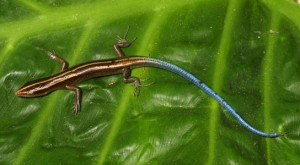Copper-striped blue-tailed skink from Hawaii is officially extinct
Sunday, March 25th, 2012 2:11:43 by Taimoor Tariq
Scientists have confirmed that there have been no sightings of the blue-tailed lizard in the Hawaiian Islands since the 1960s and are now calling this vertebrate species extinct
According to scientists, a species of lizard from the Hawaiian Islands is officially extinct. The copper striped blue-tailed skink whose biological name is Emoia impar, was last seen in the Na’Pali coast of Kauai in the 1960s and since then, no one has been
able to see this beautiful creature.
Repeated surveys in the adjacent islands have not shown any progress and the scientists have now deduced that the species is no more in this world.
“No other landscape in these United States has been more impacted by extinction events and species invasions in historic times than the Hawaiian Islands, with as yet unknown long-term cascading consequences to the ecosystem,” said U.S. Geological Survey
director Marcia McNutt. “Today, we close the book on one more animal that is unlikely to ever be re-established in this fragile island home.”
“This skink was once common throughout the Hawaiian Islands, and in fact the species can still be found on many other island groups in the tropical Pacific,” says Robert Fisher, a biologist with the USGS Western Ecological Research Center. “That’s what makes
this extinction so intriguing: if an otherwise common animal can be completely extirpated from one island ecosystem but not others, then what does that tell us?”
Fisher and colleague Ivan Ineich of the Muséum national d’Histoire naturelle in Paris announced their findings on E. impar this month in the international conservation journal “Oryx,” published by Fauna and Flora International.
According to Fischer, small animals like this lizard are prone to ‘cryptic extinction’ and when a species is confused with similar species, extinction goes on unnoticed for decades.
“The extinction of native Hawaiian bird species is well documented, partly because their presence and sounds had been so distinctive to humans,” says Ineich, who is also a researcher with the French National Center for Scientific Research (CNRS). “But without
regular field surveys, we tend to overlook the disappearances of smaller, secretive species, along with the causes of their extinction.”
The exact causes of the skink’s extinction are unknown but Fischer and his colleagues believe that uncontrolled human development has played a big role in the extinction as the habitat of these creatures had been disturbed a long time ago. Scientists also
say that an invasive species of ants could also have led to this unfortunate extinction.
“There’s some evidence that an invasive ant was preying on these skinks,” Fisher says. “That’s a new factor we’ll need to examine as we look out for other at-risk species in the Pacific islands.”
Tags: extinct, Gordon Freeman, lizard, new successor, Team India, USGSShort URL: https://www.newspakistan.pk/?p=17137

















